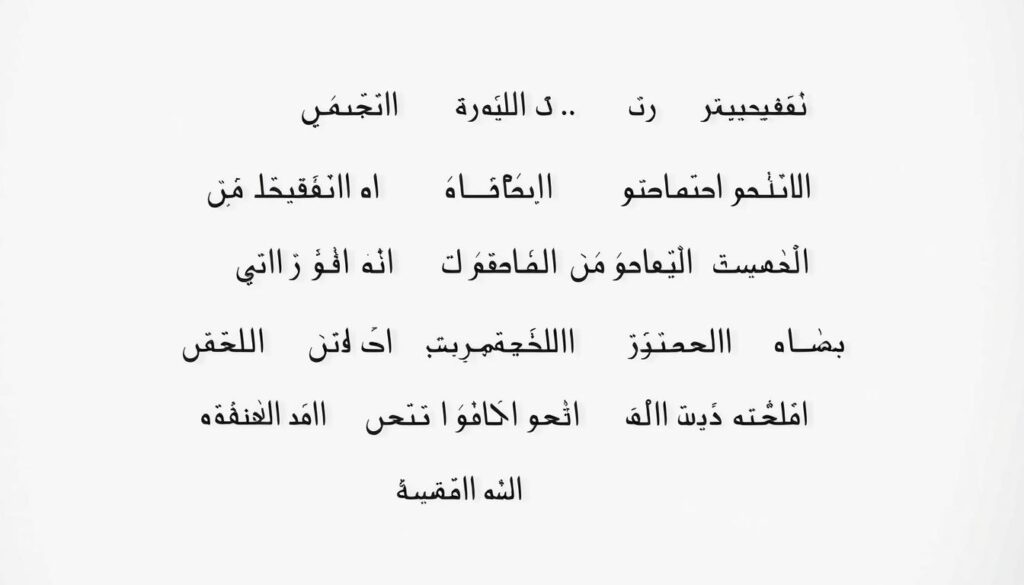Learning Arabic phrases might seem daunting, with over 12 million words. But, starting with simple phrases can make daily life easier. Just a few key words can spark a conversation and show you care about their culture, as learn arabic phrases for beginners suggest. With 78 Levantine Arabic phrases, you can lay a solid foundation for everyday talk.
Mastering Arabic phrases is key for smooth communication in business with Arabic speakers. Knowing how to greet someone in Arabic can really improve your professional and personal relationships. By starting with basic phrases, you can begin to enjoy the Arabic language and its rich culture.
Table of Contents
Why Learning Arabic Phrases Matters
Learning essential arabic phrases is key for good communication and building ties with Arabic speakers. Over 420 million people worldwide speak Arabic, making it a very common language. Knowing arabic phrases and meanings boosts cultural knowledge and makes daily chats better.
To learn arabic phrases, start with simple greetings and polite words. Saying “As-salamu alaykum” is a common way to greet in Arabic cultures. About 60% of Arabic speakers use these greetings and polite words a lot. Knowing these phrases helps in making friends and building strong connections.
- Enhanced cultural understanding and awareness
- Improved communication in daily interactions
- Increased opportunities for social and professional connections
Using essential arabic phrases in everyday talks shows respect for the culture and language. This leads to more meaningful relationships and a better understanding of the community.
Basic Greetings and Introductions
When you meet native Arabic speakers, start with basic greetings and introductions. Saying “Marhaba” (hello) and “Sabah al-kheir” (good morning) can help a lot. You can find many online resources to learn phrases like “Masa’ al-khayr” (good evening) and “Ana ismi…” (my name is…).
It’s important to use polite language and respectful titles. Saying “Min fadlik” (please) and “Shukran” (thank you) shows you care. When you introduce yourself, say “Ana ismi…” followed by your name, and then “Tasharraft biliqā’ik” (nice to meet you). You can learn these phrases online and practice your pronunciation.
To make your introductions better, try saying “Kayfa halak?” (how are you?) and answer with “Alhamdulillah” (fine, thank you) or “Mabrook” (congratulations). Learning these phrases online can help you grow your vocabulary.
Some key phrases to remember include:
- “Marhaba” (hello)
- “Sabah al-khayr” (good morning)
- “Masa’ al-khayr” (good evening)
- “Ana ismi…” (my name is…)
- “Tasharraft biliqā’ik” (nice to meet you)
These phrases are key for basic greetings and introductions. Learning them can help you start strong in Arabic.
Essential Phrases for Daily Life
Learning arabic phrases for beginners is key for everyday life. Knowing the right phrases can greatly help. For example, understanding shopping and dining out basics is vital. We’ll look at useful shopping and dining phrases, like asking prices and ordering food.
When shopping, knowing “Bekam?” (how much?) and “Aandokom…” (do you have…) is important. These help you shop with confidence. For dining, phrases like “I’d like to order…” and “Where is the restroom?” improve your experience.
- Useful expressions for shopping:
- Bekam? (how much?)
- Aandokom… (do you have…)
- Key phrases for dining out:
- I’d like to order…
- Where is the restroom?
Learning these phrases can enhance your daily life. Whether shopping or dining, knowing arabic can make a big difference.
Navigating Directions in Arabic
Traveling to Arabic-speaking countries? Knowing basic directions in Arabic is key. Start with phrases like “Ayna al-maktaba?” (where is the library?) and “Kam thaman hadha?” (how much is this?). These help you ask for directions and understand answers.
It’s also important to know Arabic cardinal directions. The main terms are شمال (Shamaal) for north, جنوب (Janub) for south, شرق (Sharq) for east, and غرب (Gharb) for west. Use these to ask for directions, like “أنا سأذهب إلى الشمال” (I will go to the north). For more phrases, check out language learning resources with guides and tutorials.
Some essential phrases for directions include:
- أَيُّ طَريقٍ؟ (Ayyu tariqin?) – Which way?
- يَمِين (Yameen) – Right
- يَسَار (Yasar) – Left
- مُباشَرةً / على طول (Mubasharatan / Ala Tool) – Straight
Learning these phrases boosts your confidence in navigating Arabic directions. Practice your pronunciation and use online resources to improve your Arabic skills.
Communicating with Friends and Family
When talking to friends and family in Arabic, it’s key to be polite and say thank you. Learning arabic phrases and meanings makes you more confident. Saying “Ahlan wa Sahlan” (welcome) and “Shukran” (thank you) shows respect and gratitude.
To learn arabic phrases, practice often and dive into the language. Start with basic greetings like “As-salamu alaykum” (peace be upon you) and “Ismi…” (my name is…). Using essential arabic phrases like these strengthens your bonds with loved ones.
Knowing phrases like “Mā ismuka?” (what is your name?) and “Kayfa haluk?” (how are you?) is also helpful. By practicing these, you’ll get better at talking and show your loved ones you care.
Emergency Phrases You Should Know
Traveling to a foreign country means learning key phrases for emergencies. Knowing phrases like “It hurts here” and “I need to see a doctor” can be lifesaving. We’ll cover important phrases for health emergencies and travel issues.
Starting with arabic phrases can be tough, but it’s vital for unexpected situations. Arabic is spoken by over 420 million people and is an official language in 22 countries. Its widespread use shows its importance in culture and geography.

Key Phrases for Health Emergencies
In health emergencies, fast communication can cut response time by 30%. Knowing local phrases is key. Here are some essential ones:
- المريض يحتاج إلى الراحة (Al-mareed yahtaj ila ar-raha) – The patient needs rest.
- ذهبنا إلى قسم الطوارئ بسرعة (Dhahabna ila qism at-tawari’ bisur’a) – We went to the emergency room quickly.
- العلاج يستغرق أسبوعًا (Al-‘ilaj yastaghriq ‘usbua’) – Treatment takes a week.
Important Expressions for Travel Issues
Traveling requires knowing arabic phrases for emergencies. Here are some vital ones:
- أين المستشفى؟ (Ayn al-mustashfa?) – Where is the hospital?
- أحتاج إلى طبيب (Ahtaj ila tabeeb) – I need a doctor.
- المريض يحتاج إلى علاج سريع (Al-mareed yahtaj ila ‘ilaj saree’) – The patient needs urgent treatment.
Expressing Feelings in Arabic
Learning common arabic phrases is key to showing feelings in Arabic. The language has many words for emotions like joy, sadness, and anger. For example, “love” (حب – hubb) can mean romantic, family, or deep love. It’s important to grasp the emotional side of Arabic when learning online.
Some top phrases for feelings include فرح (farah) for “joy” and سعادة (sa’ada) for “happiness.” Arabic also has words for sadness like كآبة (ka’aba) and حسرة (hasra). For anger, you can use غضب (ghadab) and سخط (sakht). Knowing these helps you share your feelings and connect with others.
For more on Arabic phrases, check out the Arabic expressions for emotions and feelings page. It offers great insights and resources. With effort, you can get good at showing feelings in Arabic and improve your speaking skills.
Getting good at Arabic phrases for feelings takes practice and dedication. Use online tools, language exchange, and keep practicing. This way, you’ll understand Arabic better and connect with people more easily.
Arabic Phrases for Socializing
Learning arabic phrases is key for socializing in Arabic-speaking countries. Knowing essential phrases makes everyday situations easier. Start a conversation with “Ezayak” (how are you?) or “Yalla bina” (let’s go). These help in building friendships and relationships.
For small talk, the right phrases matter a lot. Say “Inshallah” (God willing) or “Akeed” (sure) to show interest. “Shaku maku” (what’s up?) is great for casual chats. Knowing these phrases helps you communicate well and avoid misunderstandings.
To learn arabic phrases, start with the basics like the alphabet and common phrases. Practice with native speakers or take online courses. With effort, you’ll get better at arabic phrases and improve your social skills.

- Ezayak (how are you?)
- Yalla bina (let’s go)
- Inshallah (God willing)
- Akeed (sure)
- Shaku maku (what’s up?)
Learning these phrases can make a great first impression. Practice often and learn how to learn arabic phrases well. This will boost your socializing skills.
Overcoming Language Barriers
Traveling to a foreign country can be tough because of language barriers. Learning common Arabic phrases is key. This includes greetings and basic expressions. You can learn these online, which lets you practice with native speakers and find many learning resources.
Good communication is vital to get past language barriers. Practicing with native speakers and using apps like Google Translate help a lot. Also, knowing local symbols and signs helps a lot, like in hospitals and on public transport.
Some important Arabic phrases to know are asking for directions, checking prices, and saying thank you. Learning these can make your interactions with locals better and show respect for their culture. Talking to locals in their language can also make your trip more meaningful and fun.
To get better at speaking, using online tools is a good idea. Apps and websites like Mondly offer lots of vocabulary and phrases. With these tools, you can learn Arabic phrases and improve your communication. This makes your travel more enjoyable and rewarding.
Expanding Your Arabic Vocabulary
Learning Arabic means growing your vocabulary. It’s important to start with common . This helps you feel more confident in daily conversations.
Use apps like AlifBee for lessons and exercises. Watching Arabic TV or reading news also helps. This way, you learn new and understand the culture better.
Remember, learning vocabulary is a long-term effort. Keep practicing and don’t worry about mistakes. With hard work and a desire to learn, you’ll get better at Arabic.
FAQ
Why is learning Arabic phrases important?
What are some common Arabic greetings and introductions?
What are some useful phrases for daily life in Arabic?
How can I ask for directions and understand responses in Arabic?
What are some important phrases for communicating with friends and family in Arabic?
What are some essential emergency phrases in Arabic?
How can I express feelings and emotions in Arabic?
What are some useful Arabic phrases for socializing?
How can I overcome language barriers and improve my Arabic language skills?
What are some strategies for expanding my Arabic vocabulary?
Source Links
- 78 Levantine Arabic Phrases To Start Speaking – StoryLearning – https://storylearning.com/learn/arabic/arabic-tips/levantine-arabic-phrases
- 3 Ways to Say How are you in Arabic – https://www.golearnarabiconline.com/blog/3-ways-to-say-how-are-you-in-arabic
- Discover 20+ Arabic Words Common in Everyday Conversations – Quran Oasis – https://quranoasis.com/arabic-words-common/
- 40 Common Arabic Phrases & Expressions – https://nashraharabic.com/40-common-arabic-phrases-expressions/
- Why Learn Arabic? 7 Doors You’ll Open (and 7 You’ll Regret Leaving Shut) – KALIMAH – https://kalimah-center.com/why-learn-arabic/
- Basic Arabic Phrases: A Comprehensive Guide to Arabic Sayings – https://promova.com/blog/arabic-phrases
- Self-Introductions – ArabicPod101 – https://www.arabicpod101.com/lesson/learn-arabic-in-three-minutes-1-selfintroductions?src=blog_banner
- Arabic for everyday use : Beginner’s Guide to Phrases and Expressions – https://talkao.com/blog/arabic-for-everyday-use-guide-to-phrases-and-expressions/
- 101 Essential Common Arabic Phrases You Must Know – https://arabictutoronline.com/common-arabic-phrases/
- 100 Useful Arabic Phrases to Navigate Arab Countries – https://www.fluentin3months.com/arabic-phrases/
- Directions In Arabic – KALIMAH – https://kalimah-center.com/directions-in-arabic/
- Essential Arabic phrases for travelers – Talkpal – https://talkpal.ai/vocabulary/essential-arabic-phrases-for-travelers/
- Learn the Directions in Arabic: A Simple Guide – https://imanupdates.com/directions-in-arabic/
- Basic Arabic Conversation For Beginners – KALIMAH – https://kalimah-center.com/basic-arabic-conversation-for-beginners/
- Arabic Greetings and Responses | Powerful Greetings you Need – https://arabictutoronline.com/arabic-greetings-and-responses/
- The most important Arabic sentences used in everyday life – https://nashraharabic.com/the-most-important-arabic-sentences-used-in-everyday-life/
- Hospital Vocabulary In Arabic – KALIMAH – https://kalimah-center.com/hospital-vocabulary-in-arabic/
- Emotional Vocabulary in the Arabic Language – Talkpal – https://talkpal.ai/vocabulary/emotional-vocabulary-in-the-arabic-language/
- How to Say “I Love You” in Arabic: A Guide to Different Dialects – https://translationblog.net/how-to-say-i-love-you-in-arabic/
- How are you? in Egyptian Arabic (with audio!) | Playaling – https://playaling.com/how-are-you-in-egyptian-arabic/
- Online Arabic Conversation Classes -Spoken Arabic Classes – https://alwalidacademy.com/online-arabic-conversation-classes/
- 11 Arabic Expressions You have Definitely Heard (But Probably Do not Know the Meaning Of) – https://www.etoninstitute.com/blog/11-arabic-expressions
- Learn Modern Standard Arabic (MSA) Online – Arab Academy – https://www.arabacademy.com/learn-modern-standard-arabic-msa-online/
- How to Overcome the Language Barrier When Traveling Abroad – https://medium.com/@krys_stories/how-to-overcome-the-language-barrier-when-traveling-abroad-657fc267e19c
- Tips to Overcome Language Barriers in the UAE – https://www.propertyfinder.ae/blog/overcome-language-barriers-uae/
- How to Memorize Arabic Vocabulary – Madinah Arabic – https://www.madinaharabic.com/blog/how-to-expand-your-arabic-vocabulary.html
- How to Increase Arabic Vocabulary in 7 Steps | Alifbee Blog – https://blog.alifbee.com/how-to-increase-arabic-vocabulary-in-7-steps/

